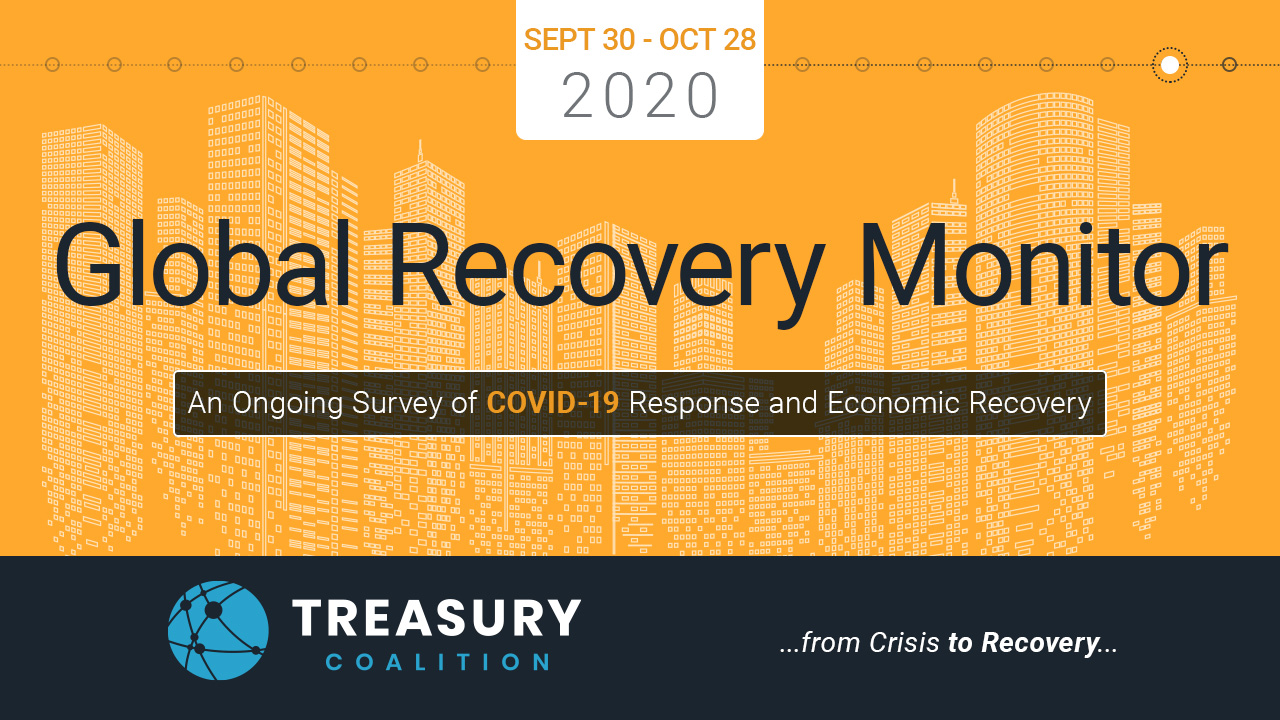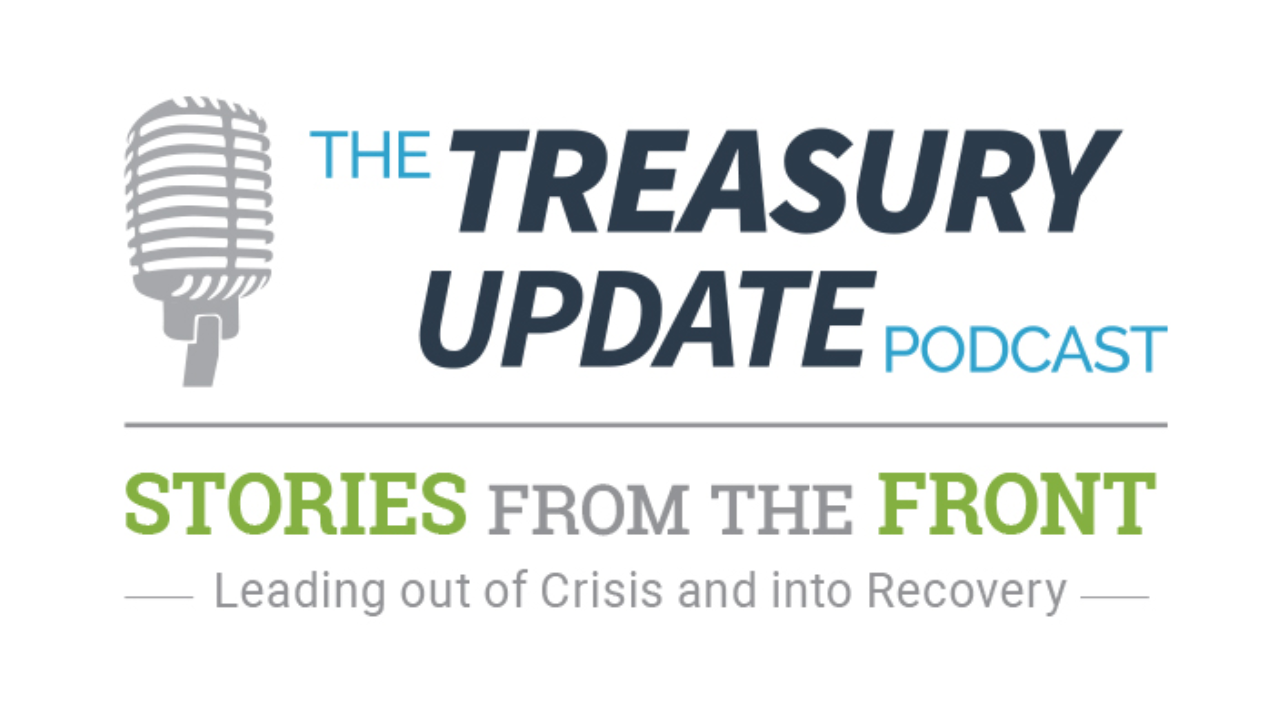
Episode 118
Stories from the Front: Finance as a Strategic Partner
On this episode of the Stories from the Front series, Host Craig Jeffery joins Anita Mehra, Vice President of Global Financial Services at Microsoft, to discuss finance as a strategic partner amid the COVID-19 global pandemic. They explore ways to support customers and key partners in the most critical times, innovative approaches for business and personal growth, recommendations to ensure adaptability and resilience across organizations, and key learning points for finance and treasury leaders. Listen in to find out how to position yourself and your company for success in critical times.
Host:
Craig Jeffery, Strategic Treasurer


Speaker:
Anita Mehra, Microsoft


Subscribe to the Treasury Update Podcast on your favorite app!
Episode Transcription - Episode 118 - Stories from the Front: Finance as a Strategic Partner
Craig Jeffery:
Welcome to the Treasury Update Podcast. This is Craig Jeffrey, and today’s episode is finance as a strategic partner. And I’m here with Anita Mehra, who’s the vice president global financial services at Microsoft. Anita, welcome to the podcast.
Anita Mehra:
Thank you for having me, Craig
Craig Jeffery:
Anita, we’ve known each other for some time, but not everybody who’s listening will know your career background. So I wonder if you could give us a bullet point list of some of your jobs through your career.
Anita Mehra:
Yeah. Happy to share that. It’s been a fun journey for a long time. I, interestingly enough, started out my career in academia. I was teaching finance and international business at the University of Wisconsin Milwaukee Campus for about five years, and then searched for warmer climates and moved to California, where I had to lead the tech area. I was in Silicon Valley working for LSI Logic. I had great experience working in treasury, tax, and M&A.
Anita Mehra:
And then 15 years ago, my journey led me to Microsoft where I’ve spent 11 years in corporate treasury doing some fun and interesting things. And then more recently, I’ve been here in the global financial services or payment services area where we manage payment solutions, credit collections and financing for customer, partners, and vendors.
Craig Jeffery:
This series we talk about some of the challenges that have come about with any type of disruption, and the most recent disruption has obviously been COVID, which brought about a lockdown for travel and more work from home. I was wondering if you could tell us how this has impacted you and your group maybe in the early days as we think about how that impacted your team. And then customers and partners, what were the main impacts in the changing environment of moving to home?
Anita Mehra:
Yeah. I think it’s been a very unusual time for all of us and, interestingly enough, around the globe. And I recall when this first became a bigger deal in the U.S., we had just merged with another team. In January, we were going to a lot of process workshops. We had teams from around the world visiting Redmond. And halfway through in January, we said, “Well, some of them who were from Singapore, their country was going into lockdown and had to fly back.”
Anita Mehra:
It is interesting how we think and process stuff, because we said, “Oh, no big deal. We are still fine in Europe and in the U.S.,” and very quickly everything changed. And I think with the team, it has been a challenge of first it felt like it’s a sprint. We just need to go, go, go and be lucky enough to have all the technology around us to enable us to work from home, because we were all working from home around mid-February. Initially, we made the effort to connect, so there were a lot more meetings, coffee chats replacing hallway conversations.
Anita Mehra:
As weeks turned into months and months into what they call quarters in our business, two quarterly earnings release down and we are still working from home, we quickly learned that maybe instead of more coffee chats, we just need to have more free time so people can take care of personal lives too. Work and life are not two separate things. With schools shutting down and parents having to work through paying attention to their kids, schooling them, and doing the work stuff, I think giving time back became more and more important.
Anita Mehra:
And then if I reflect on the work side, there were very different challenges that we can go through.
Craig Jeffery:
Yeah. And on the work side, maybe one of the first things you can talk about is the rate of speed that this change happened, right? Everything was fine. And then all of a sudden, it seemed like it was about a week or so and nobody was moving or going anywhere. So maybe you could talk about that in terms of the speed. You and I have talked about the impact of the Arab Spring some years ago and how that impacted much of your organization in years past, but maybe you could just reflect on some of the differences or compare and provide some color on that.
Anita Mehra:
Yeah. I think that was, again, an interesting situation to go through and how to make sure employees in the impacted countries were taken care of, even making payroll, and that was in treasury at that time. And then again, during the credit crisis, right? So lots of challenges. But I think the biggest difference here in my mind is that it was limited impact with the Arab Springs. With the credit crisis, it was again driven mostly by the financial sector. It was a big deal, and yet it was in some sense contained.
Anita Mehra:
In response to our customers and partners, we have plenty of time to figure out how we can help them, how the government is helping them. In this one, I think for me personally, the biggest difference is the speed at which everything came to a standstill. You cannot execute transactions even if you wanted to. It’s not a lack of liquidity alone. You may have the liquidity, but you don’t know how long you need to maintain it, what’s going on.
Anita Mehra:
I think that was really critical, and it impacted our customers and partners around the globe at a very rapid pace. And I think to me, that’s the biggest difference, and then we had to work through addressing their needs.
Craig Jeffery:
I like that comparison of the crisis and the Arab Spring. I think that’s helpful to know how much more rapidly this unfolded upon us. You talked about your customers and your partners. I guess there’s a couple of things you can probably talk about. I know the use of cloud has expanded rapidly during this time. You have to be able to use things like Teams for communication. People are moving more transactions and activity to the cloud, so I’m sure that’s created a demand for services. But at the same time, you have to support both your customers and partners.
Craig Jeffery:
They may be strapped financially or run into some challenges. How did you support your customers and partners as this demand for cloud exploded while people had those challenges?
Anita Mehra:
Yeah, I think it was definitely an interesting balance to maintain on hand, as we said, for Microsoft and other similar companies that offer technology solutions. For the times when people are working from home, it was great from revenue perspective. But then as treasurers in folks in the finance field, when we think about cashflow, that was a very different equation. And in my current role, I spent a lot of time with our sales teams, and therefore I get involved with customers and now I had a new angle to say, “Okay, what are they experiencing?”
Anita Mehra:
So I think for me personally and for my team, the most important thing was to listen to our customers and partners and react as quickly as we could. At the same time, build some proactive solutions so we are not waiting for someone to say, “Hey, I can’t make this payment. What else can I do? I want to apply more technology, but I can’t pay you three months, six months.” Right?
Anita Mehra:
We did put together a few proactive solutions to support them with how those payments are structured, so we could then balance the need for supporting what they are solving for, clearly what the company is solving for, and yet managing risk. I think that was in some ways most exciting, challenging, and yet rewarding and impactful activity to go through.
Craig Jeffery:
Yeah. That had a lot of characteristics. I guess the idea of, yeah, you could increase revenue, but if you never collect on it, that would be defeating the purpose. How do you support your customers and partners in the most critical time? I liked the examples you gave. As you did this, I mean, this is part of the reason why we’re calling this finance as a strategic partner. You’re getting involved, helping the business grow and support your key partners, customers and business partners.
Craig Jeffery:
I know it has had some impact, but how much of an impact has that had on the view of finance and treasury in the organization? And then do you think this is going to change the positioning on a permanent basis or just short term?
Anita Mehra:
Yeah. It definitely has been extremely impactful. And it, first of all, gave us a window in finance teams into the life of our sales teams, of our customers and partners to reflect on what is it that we can truly do and connecting the dots from whether we are doing credit reviews, offering payment terms or collecting, how does that complete the full circle keeping customer centric solutions in mind. And that’s where I think you have talked about even your focus is strategic treasurer, it really is.
Anita Mehra:
And you’ve been talking about this for over a decade on how a treasurer needs to evolve and become more strategic. And this was a great Kodak moment, so to speak, right? It’s a challenge, and yet an amazing opportunity offered to finance to say, how can we step up and really make a contribution to the company and be seen as that strategic partner? How each of us showed up, how we delivered, and how collaborative, proactive, and thoughtful we were in delivering that made a difference.
Anita Mehra:
Some teams may have done it well and some were like, well, yeah, we’ll do what we can, but may not have shown up the right way. So to me, this definitely was a Kodak moment where the teams had to step up and deliver. I’m fortunate to have a team that was just amazing. I have no idea how they did it all, but they did. And I think that’s built the credibility. And in the past, if the team was seen as, oh yeah, if the customer looks for some solutions on payment structuring, we’ll come to you.
Anita Mehra:
And yup credit risk don’t block my revenue. Let me be,” kind of conversations to now, “Hey, we can do without you. Now we know how you can be supporting us.” So in some ways, there’s increasing demand. We are being pulled into conversations when large transactions with our strategic customers are being structured. So instead of being at the tail end, we are more and more at really being front and center.
Craig Jeffery:
So some of those solutions, would you describe them as more providing flexibility on pricing or the timing of payments or other types of creative structuring? How would you characterize what you were doing? I know you did a number of things, but how would you characterize some of those steps?
Anita Mehra:
I think pricing discussions or contract details, we have other teams that we partner with on those. We can offer suggestions, but we have experts to manage it. Our team was focused really on credit assessment, and we started using machine learning models. Instead of taking a day to seven days to respond to a customer’s credit review and application to get them to sign a contract, we can now do it in seconds. It’s pretty much like your online credit. When you’re buying something, you can just check it off.
Anita Mehra:
We did that to really increase the velocity of the deal, because the customers needed solutions quickly. And then we were very thoughtful about, yes, we do need to take more risks. We can’t really go buy recently reduced credit ratings or looking at their financials that may show, oh, they’re a new drop? Of course, it dropped. That’s where we had to be creative and say, “What risk are we willing to take?” We still need to be stewards of the company from a financial perspective and say, “What risk is still not acceptable?”
Anita Mehra:
Unfortunately, some companies will not survive this and that happens in every crisis. We want to be there for our customers and partners, but that was our role as the financial advisor to say, “Hey, we can take this much additional risk, but this one at the extremely may not, or we take shorter term exposure to those and how do we have to mitigate that risk?” I think that was something creative that came through this crisis. The other one was around structuring. So normally for shorter term, we may have done normal trade terms.
Anita Mehra:
We were more thoughtful about what can be deferred for a certain amount of time and then have regular payments, or longer term financing solutions. We already had a financing program and this was just, how do we expand it and how do we get more creative to support them?
Craig Jeffery:
Now, as we look a little farther in the process, now we’re six months into the work from home, as you said, weeks turned into months, turned into quarters. Hopefully it’ll end with quarters, but what are you doing now that’s differently? I think you already described some things with employees as well with having a little more free time, but anything differently with customers and partners?
Anita Mehra:
I think the most interesting one for me has been in the past, there was a lot of travel involved to go visit a customer or partner to have that engagement and being in technology world or technology us available to most companies now and we are all getting comfortable with it. So in our case, leveraging Teams and always using the video feature. I know in the U.S. when we were talking to our global teams in the past, they would have their camera on, us here in the U.S. or Seattle area wouldn’t. And now that’s the best way to communicate.
Anita Mehra:
We are actually doing customer engagements, so Teams, so that we keep that dialogue going. And it’s amazing how quickly people have adapted. I think that’s the big one. And second is just rethinking how we prioritize what is most important. It’s not just managing our schedules, but truly saying, what do we need to do differently? And what do we completely stopped doing to be effective partners to other functions in the company and to our customers?
Craig Jeffery:
Yeah, that should be a whole podcast. What do we need to stop doing and how do you make those decisions? But a lot of what you’re talking about is both being creative, but also being adaptable and resilient. I don’t know if you have any guidance or summary information that would be useful for others to think about or to enact to help their organizations be both more flexible, resilient, or adaptable, whatever word you want to use on that. Any advice on that?
Anita Mehra:
I think what’s worked for us and hopefully it’ll apply to other situations is really around adapting to how we work, Right? I said we can learn from making mistakes, and that’s one good thing about the culture that we work in, and we’ve been on this transformational journey now for five years. The idea about failing fast, right? So you try something new. Doesn’t work. That’s okay. We learn from the mistake and keep going as the org agility.
Anita Mehra:
And that was so very applicable in this scenario where, as I said in the beginning, we said lots more meeting a lot more touch points, and you realize you’re just chewing up everyone’s bandwidth. We had to step back and try something different to say, block half a day, block whatever time you need so you can take care of your own mental health and stress. And I think that to me is key, remembering that each one of us, a this has turned from a sprint to a marathon, we each need to take the time to take care of ourselves, our health, and do the same for our loved ones.
Anita Mehra:
And mental health matters as much as physical health, and that’s the biggest learning for me personally. As I talk to my team members, I’d reflect on my own needs. The stress builds up. We are used to dealing with risk, and we talk about how uncertainty is not good for financial markets. Uncertainty is not good for humans either. So not knowing when this is going to get better makes it harder for all of us to keep going. So I think knowing that yes, things will get better may never be the way it used to be. And that is okay.
Anita Mehra:
So I think that’s the resiliency piece, but really being there for each other and looking at the person as their whole self, not just as a functional person saying, “This is my credit manager who shows up and does this,” it is more of, “Hey, this is Mary and Mary has two dogs, and she has a child who is in primary school and is still doing lessons on their Teams with their teacher,” right? I think that makes a huge, huge difference.
Anita Mehra:
Because in that failing fast, learning from mistakes, you are then more willing to accommodate and understand the other person. I think those are some of the key learnings for us.
Craig Jeffery:
I did want to give you a chance as we finish out the podcast to share other learning points besides adaptability and resiliency, but some other learning points that you would emphasize to other treasury and finance leaders. What’s essential, Anita?
Anita Mehra:
First is really never let a crisis go to waste, as they say so, right? Use this as a learning opportunity, a way to rethink what we do, how we do and why we do it so we can be more innovative. And for us, that’s what’s happened. We come up with new ideas and innovative way of doing things, which we probably wouldn’t have done if we didn’t go through this experience. So that’s clearly one. And I think the second one is around just being a better human is the simplest way I can put it, right?
Anita Mehra:
Having empathy for your customers, for your coworkers, for people you work with every day and truly listening. I think in some ways we are losing the art of understanding the other person. We listen to so we are ready to respond very quickly. But bringing in diverse ideas, listening to people’s ideas, and giving them room to explore it before shutting it down connects back to the innovation idea. So I think I would say use that as an opportunity to innovate and lead with empathy.
Craig Jeffery:
Thank you so much for your time and congratulations on the innovation in this time of crisis. And I liked your line about never let a crisis or never let a global pandemic go to waste.
OUTRO:
You’ve reached the end of another episode of The Treasury Update Podcast. Be sure to follow Strategic Treasurer on LinkedIn. Just search for Strategic Treasurer. This podcast is provided for informational purposes only and statements made by Strategic Treasurer, LLC on this podcast are not intended as legal, business, consulting or tax advice. For more information, visit and bookmark strategictreasurer.com.
Related Resources
Global Recovery Monitor – Period 16
This survey provides rapid exploration and response reporting on major factors impacting treasury and finance organizations. This effort is supported by the Treasury Coalition which consists of leading solution providers leveraging their networks to ensure comprehensive results for the good of the profession. Complete for early access to the results!
Stories from the Front – A Treasury Update Podcast Series
This series within The Treasury Update Podcast features interviews with treasury and finance leaders exploring: challenging situations; fresh ideas, innovative approaches, case studies and recommendations from senior treasury practitioners. These stories from the front provide a transparent look at various industries and challenging situations that provide insights and wisdom to help guide the profession into a proper mindset and approach as we continue the path of recovery.








